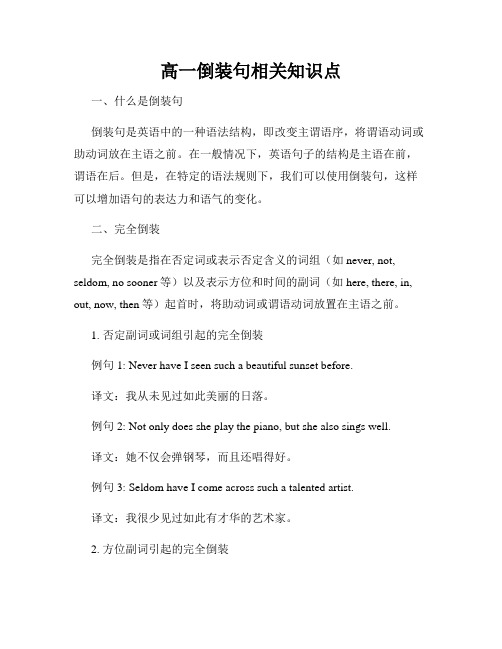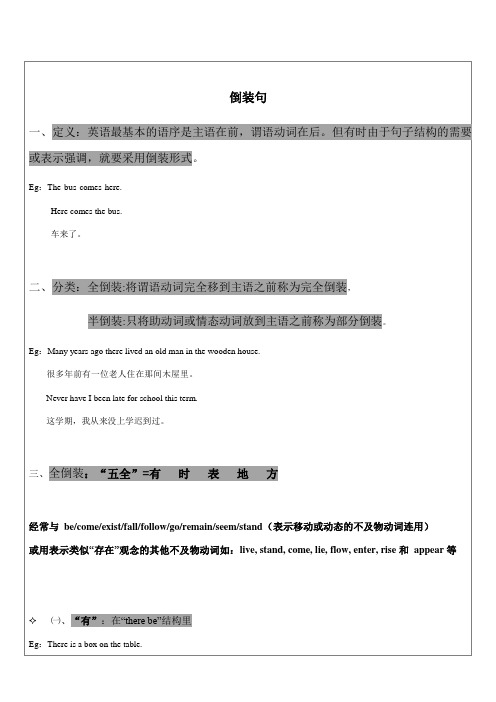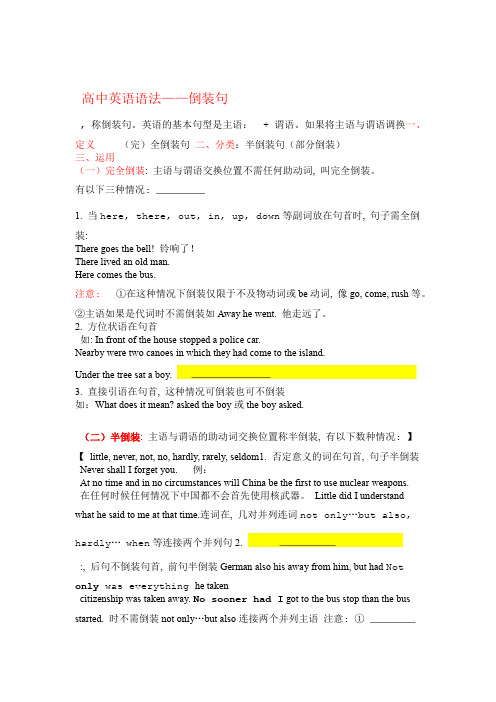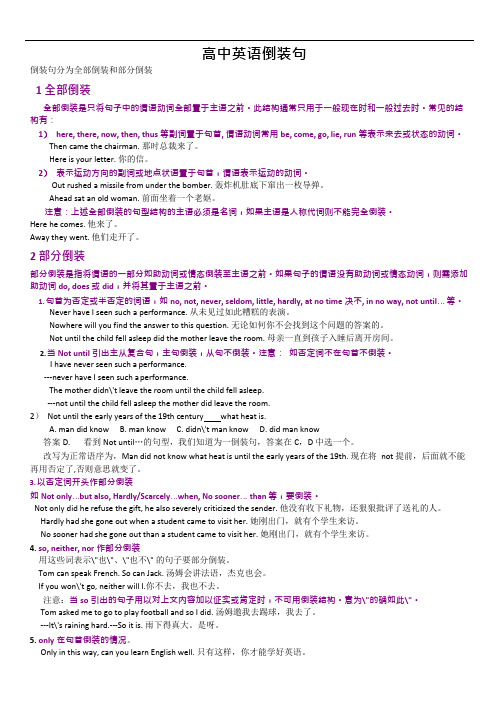高中英语人教版:必修一+倒装句语法知识汇总(附答案)+Word版
高考英语倒装句(语法讲义+练习+答案)语法复习

高考英语倒装句(语法讲义+练习+答案)语法复习预览说明:预览图片所展示的格式为文档的源格式展示,下载源文件没有水印,内容可编辑和复制倒装句讲解部分倒装1. 否定意义的词或短语,位于句首,需部分倒装。
如否定词no, not, never;半否定词hardly, seldom, scarcely, barely, rarely, little, few;no合成的代词或副词nobody, nothing, nowhere;否定的短语not until, by no means, in no way, in no time, under no circumstances。
No word did he say before he left.Never had I heard or seen such a thing.Little did I know about it.Nowhere will you find better roses than theses.Not until he went abroad did he know the truth.By no means shall we give up.2. not only (merely, alone, simply)…(but) also 连接两个并列分句,前一分句需倒装。
Not only did we lose our money, but we also came close to losing our lives.Not simply is this book interesting but also instructive.注意:Not only you but also I(连接并列主语不倒装)will attend the meeting.3. neither…nor连接两个并列分句,前后两个分句都倒装。
Neither did they write nor did they telephone.Neither is he wrong nor are you.Neither could I help you, nor could he.Neither French nor German do I know.Neither on Saturday nor on Sunday do we have lessons.注意: Neither you nor I(连接并列主语不倒装) like this book.4. Only + 状语,位于句首,需部分倒装。
高一倒装句相关知识点

高一倒装句相关知识点一、什么是倒装句倒装句是英语中的一种语法结构,即改变主谓语序,将谓语动词或助动词放在主语之前。
在一般情况下,英语句子的结构是主语在前,谓语在后。
但是,在特定的语法规则下,我们可以使用倒装句,这样可以增加语句的表达力和语气的变化。
二、完全倒装完全倒装是指在否定词或表示否定含义的词组(如never, not, seldom, no sooner等)以及表示方位和时间的副词(如here, there, in, out, now, then等)起首时,将助动词或谓语动词放置在主语之前。
1. 否定副词或词组引起的完全倒装例句1: Never have I seen such a beautiful sunset before.译文:我从未见过如此美丽的日落。
例句2: Not only does she play the piano, but she also sings well.译文:她不仅会弹钢琴,而且还唱得好。
例句3: Seldom have I come across such a talented artist.译文:我很少见过如此有才华的艺术家。
2. 方位副词引起的完全倒装例句4: Up the street ran the little boy, desperate to catch the ice cream truck.译文:小男孩沿着街道跑去,拼命想赶上那辆冰淇淋车。
例句5: Out rushed the students as soon as the school bell rang.译文:一响起学校的铃声,学生们就冲了出去。
三、部分倒装部分倒装是指在特定的情况下,将助动词、情态动词或一些特殊谓语动词放在主语之前。
这种倒装在陈述句、特殊疑问句和祈使句中均有使用。
1. 在以否定副词或词组开头的陈述句中例句6: He never comes to class late.译文:他从不上课迟到。
高中英语人教版:必修一+语法归纳总结及倒装句(附答案)+Word版

倒装句英语句子的自然语序是主语在前,谓语动词在后。
如果把谓语动词放在主语之前,就称为倒装结构;如果谓语全部放在主语之前,就称为完全倒装;如果只把助动词、be动词或情态动词放在主语之前,就称为部分倒装。
完全倒装1. 以here, there, now, then开头,谓语动词是be, come, go, follow 等词,主语为名词。
例:Now comes your turn to answer the questions.2. 以up, down, out, in, away, off 等表示移动方向的副词开头的句子, 谓语通常为go, come, rush, fly, fall 等不及物动词,主语为名词。
例:Out rushed the boy.【注意】以上两种句型中,若主语是代词,即使here, there, now, then, up, down, out, in, away, off 等放在句首,也不用倒装。
例:Out he rushed. Here you are!3. 表示地点的介词短语或副词(短语如on the wall, under the tree, in front of the house, in the middle of theroom等) 位于句首,谓语是不及物动词,主语是名词。
例:Between the two buildings stands a tall tree.East of the city lies a big river.4. 表语位于句首,构成“形容词/ 现在分词/ 过去分词+连系动词+主语” 结构。
例:Present at the meeting were Professor Smith and many other guests.5. 代词such作表语,位于句首时。
例:Such are the facts: no one can deny (拒绝) them.6. 保持句子平衡或使上下文衔接更紧密时。
高中英语倒装句讲解以及习题(附答案)

桌子上面有一个盒子。
✧㈡、“时”:表示时间副词,如:now,then,
Eg:Now comes your turn.
现在轮到你了。
✧㈢、“表”:表语放句子前,“表语+系动词+主语” 的结构
Eg:Present at the party were Mr. Green and many other guests.
格林先生和其他的客人在这个聚会上。
Seated on the ground are a group of young men.
一群年轻人坐在了地上。
✧㈣、“地”:地点状语放在句首
Eg:In south of the river lies a small factory.
小工厂位于河的南方。
From the valley came a cry.
山谷传来一阵哭声。
✧㈤、“方”:表方位的副词here, there 或out, in, up, down, away, off 等标志词放在句首 Eg:There lies a large wheat field in front of the house.
房子前面有一大片麦田。
Off all the lights went when I came in.
当我进来时,所有的灯都灭了。
四、半倒装:“八部”=不只让步也常需(虚)如此祝福✧㈠、“不”表示否定。
高中英语语法倒装句专题讲解有答案

高中英语语法——倒装句, 称倒装句。
英语的基本句型是主语: + 谓语。
如果将主语与谓语调换一、定义(完)全倒装句二、分类:半倒装句(部分倒装)三、运用(一)完全倒装: 主语与谓语交换位置不需任何助动词, 叫完全倒装。
有以下三种情况:1. 当here, there, out, in, up, down等副词放在句首时, 句子需全倒装:There goes the bell! 铃响了!There lived an old man.Here comes the bus.注意: ①在这种情况下倒装仅限于不及物动词或be动词, 像go, come, rush等。
②主语如果是代词时不需倒装如Away he went. 他走远了。
2. 方位状语在句首如: In front of the house stopped a police car.Nearby were two canoes in which they had come to the island.Under the tree sat a boy.3. 直接引语在句首, 这种情况可倒装也可不倒装如:What does it mean? asked the boy或the boy asked.(二)半倒装: 主语与谓语的助动词交换位置称半倒装, 有以下数种情况:】【little, never, not, no, hardly, rarely, seldom1. 否定意义的词在句首, 句子半倒装Never shall I forget you. 例:At no time and in no circumstances will China be the first to use nuclear weapons.在任何时候任何情况下中国都不会首先使用核武器。
Little did I understand what he said to me at that time.连词在, 几对并列连词not only…but also,hardly… when等连接两个并列句2.:, 后句不倒装句首, 前句半倒装German also his away from him, but had Not only was everything he takencitizenship was taken away. No sooner had I got to the bus stop than the busstarted. 时不需倒装not only…but also连接两个并列主语注意:①: Not only you but also I like playing chess.如, 前后两句都需倒装在句首时②neither…nor如:Neither do I have a sister nor does my husband.3. only在句首强调状语,主句半倒装:如:Only then did I realize that I was wrong.Only in this way can I learn from my fault.Only when the war was over in 1918, was he able to get back to work.:强调主语不倒装: only注意Only the teachers can use the room. 从句不倒装:在句首时, 主句倒装, that4. so…that句型, so So easy is it that a child can learn it.如:So hard did he work that he finally won the fame.I saw the film, so did he.5.省略了if的虚拟条件句如:Had I been informed earlier, I could have done something.Were she here, she would support the motion.【典型例题】1. _____can you expect to get a pay rise.A. With hard workB. Although work hardC. Only with hard workD. Now that he works hard2. Seldom ____ any mistakes during my past few years of working here.A. would I makeB. did I makeC. I did makeD. shall I make3. Not until all the fish died in the river, _____ how serious the pollution was.A. did the villagers realizeB. the villagers realizedC. the villagers did realizeD. didn't the villagers realize4. Not until I began to work ____ how much time I had wasted.B. did I realize A. didn't realizeC. I didn't realizeD. I realized5.—Do you know Jim quarrel with his brother?—I don't know, _______.A. nor don't I careB. nor do I careC. I don't care neitherD. I don't care also6. Only by practicing a few hours every day _____ be able to waste much time.A. you canB. can youC. you willD. will you7. Not until the early years of the19th century ___ what heat is.A. man did knowB. man knewC. didn't man knowD. did man know8. _____got into the room, _____ the telephone rang.A. He hardly; thenB. Hardly had he; whenC. He had not; thanD. Not had he; when9. Only in this way ______ do it well.A. must weB. we couldC. can weD. we can10.—I don't think I can walk any further.—_____, Let's stop here for a rest.A. Neither can IB. Neither do IC. I didn't think soD. I think so答案:CBABB DDBBB【课后巩固】1.His mother had talked to him for many minutes while he was watching TV, but _.A. a little did he hearB. little did he hearC. little heard heD. a little heard heB2 _____the plane.A. Flew downB. Down flewC. Down was flyingD. Down flyB3. During the war, ____but also he lost his wife and his child.A. not was his job in the lab taken awayB. not only was his job in the lab taken awayC. not merely his job in the lab was taken awayD. not just was taken away his job in the labB2. What sport do you like best?——Springboard diving (跳板跳水).——____to dive into water from high board!A. What a fun is itB. How fun it isC. How a fun is itD. What fun it isD5. I think this is the first time that we have met.___anywhere.A. Before have we never seen each otherB. Never before we have seen each otherC. Each other have we seen never beforeD. Never before have we seen each otherD6.——We have to stop talking here outside. Listen,_____!——Hurry up, or we'll be late.A. There goes the bellB. There does the bell goC. There the bell goesD. Goes the bell thereA7. ______ snacks and drinks,but they also brought cards for entertainment when they had a picnic in the forest.A. Not only they broughtB. Not only did they bringC. Not only brought theyD. Not only they did bringB8. She didn't come to the party last Sunday.___, she must have made the party more exciting.A. If she cameB. Would she comeC. Had she comeD. Did she comeC9. Hardly ____ when it began to rain.A. had he arrivedB. arrived heD. did he arrive C. he had arrivedC10. I received his mother's telephone call at eleven.__that he was badly hurt in an accident yesterday.A. Then did I knowB. Only then I knewC. Only then did I knowD. Only then knew IC11. There ____ .A. come theyB. they comeC. they are comeD. they will comeB12. ______, I would have given you his address.A. If you asked meB. You had asked meC. Should you have asked meD. Had you asked meD13. Only when you have finished your homework ___ go home.A. can youB. would youC. you willD. you canA14. Many a time _____ me good advice.A. he gaveB. does he giveC. he has givenD. has he givenD.15. Hardly _____ when the bus suddenly pulled away.A. they had got to the bus stopB. they got to the bus stopC. did they get to the bus stopD. had they got to the bus stopD16. ____ have I seen a better performance.A. EverywhereB. somewhereC. Everywhere elseD. NowhereD17. Only when class began ___ that he had left his book at home.A. will he realizeB. he did realizeC. did he realizeD. should he realizeC18. Only in an hour ago ____ out why he was absent.A. did the teacher foundB. the teacher foundC. did the teacher findD. had the teacher foundC19. Not a single word ____ at the beginning.A. did he sayB. has he saidC. he saidD. he has said A.20. ______ that I couldn't be absorbed in the work.A. They made such talkedB. So loudly they talkedC. It was noise outsideD. Such a loud noise did they make D21. ______ that he could not speak for a long time.A. So frightened was heB. So frightened he wasC. Was he so frightenedD. Frightened was heA22. Not only ______ a promise, but he also kept it.A. had he madeB. he had madeC. did he makeD. he makesC23. ______ I had time, I would have run round that lake again.A. IfB. UnlessC. HadD. WhenC.。
(完整word版)高中英语倒装句语法知识汇总(可编辑修改word版)

高中英语倒装句倒装句分为全部倒装和部分倒装1 全部倒装全部倒装是只将句子中的谓语动词全部置于主语之前。
此结构通常只用于一般现在时和一般过去时。
常见的结构有:1)here, there, now, then, thus 等副词置于句首, 谓语动词常用be, come, go, lie, run 等表示来去或状态的动词。
Then came the chairman. 那时总裁来了。
Here is your letter. 你的信。
2)表示运动方向的副词或地点状语置于句首,谓语表示运动的动词。
Out rushed a missile from under the bomber. 轰炸机肚底下窜出一枚导弹。
Ahead sat an old woman. 前面坐着一个老妪。
注意:上述全部倒装的句型结构的主语必须是名词,如果主语是人称代词则不能完全倒装。
Here he comes. 他来了。
Away they went. 他们走开了。
2 部分倒装部分倒装是指将谓语的一部分如助动词或情态倒装至主语之前。
如果句子的谓语没有助动词或情态动词,则需添加助动词do, does 或did,并将其置于主语之前。
1.句首为否定或半否定的词语,如no, not, never, seldom, little, hardly, at no time 决不, in no way, not until…等。
Never have I seen such a performance. 从未见过如此糟糕的表演。
Nowhere will you find the answer to this question. 无论如何你不会找到这个问题的答案的。
Not until the child fell asleep did the mother leave the room. 母亲一直到孩子入睡后离开房间。
2.当Not until 引出主从复合句,主句倒装,从句不倒装。
高中英语倒装句(完整版详细讲义+随堂练习)
Grammar of the Inversion (Module 5 Unit 4)倒装句英语最基本的语序是主语在前, 谓语动词在后。
但有时由于句子结构的需要或表示强调, 就要采用倒装形式。
倒装分两种情况: 1)将谓语动词完全移到主语之前称为完全倒装, 2)只将助动词或情态动词放到主语之前称为部分倒装。
并且强调性倒装和以so, neither, nor开头的句子是高考例题的热点。
一、倒装句的意义1.用倒装构成疑问句,适应一定的语法结构的需要。
.in?Was the People's Liberation Army founded in 1927?2.为了强调某一部分, 而把这部分放到句首, 构成倒装。
t.fo.schoo.thi.term.So early did he come to school that no other students came.二、倒装的用法完全倒装1.在“ther.be”结构里, there是引导词, 主语在be后。
在“there + be”结构中的谓语动词有时不用be , 而用表示类似“存在”观念的其他不及物动词。
如: live, stand, come, lie, flow, enter, rise 和appear等。
e.g.Ther.i..bo.o.th.table.There came shouts for help from the river.There lies a large wheat field in front of the house.Many years ago there lived an old man in the wooden house.2.为了表达生动, 有时把表地点、方位的副词, 如here, there, now , then,, thus ,up, down, out, off, over, away, in等放在句首, 同时把谓语动词放在主语之前, 在here, there等副词开头的某些句子里(要用一般现在时态)。
高中英语倒装句详解及练习(附答案)
高中英语倒装句详解及练习(高考高频考点)英语中主语和谓语有两种顺序。
主语在前、谓语在后,称之为自然语序;谓语在前、主语在后称之为倒装语序。
倒装语序又分为全部倒装和部分倒装。
本文主要讲解倒装语序的句子,即倒装句。
全部倒装,就是整个谓语都放在主语之前。
如:•Here are some letters for you. 这有你的几封信。
•In came the new teacher. 新老师进来了。
部分倒装,只是谓语中的一部分进行倒装,比如助动词、情态动词、be动词等置于主语前面,其余部分仍放在主语的后面,如:•At no time will China ever behave like a superpower. 中国在任何时候都不做超级大国。
•Only in this is it possible for us to accomplish the task. 只有这样我们才能完成任务。
1.疑问句多为倒装句。
英语中的疑问句就是一种倒装形式。
比如:•正常语序You are tired. (主语‘you’在动词‘are’之前.)•疑问形式: Are you tired? (动词‘are’ 置于主语‘you’之前. 主语和动词的位置发生了变化,这就是倒装形式。
) ,类似的还有:1.1 一般现在时中的‘be’: am I / are you / is he;do you go / does he go1.2 一般过去式中的‘be’: were you / was she;did we go / did they go1.3 现在进行时: am I going / are you going1.4 过去进行时: was he going / were they going1.5 现在完成时: have we gone / has she gone1.6 现在完成进行时: has she been going / have they been going1.7 过去完成时: had you gone1.8 过去完成进行时: had he been going1.9 一般将来时: will they go1.10 一般将来进行时: will you be going1.11 一般将来完成时: will they have gone1.12 将来完成进行时: will she have been going1.13 情态动词: should I go / would you go… …2.感叹句多为自然语序,但疑问形式的感叹句则为倒装语序。
2019-2020学年新人教版高中英语高效学案:必修一 语法倒装句讲解 Word版
姓名,年级:时间:倒装句一、全部倒装全部倒装即把整个谓语部分放在主语之前。
当副词here, there, in, out, up,down, away, back, then, ahead, off, over等位于句首、谓语动词常为be, come, go, follow, run, rush, fly, fall等不及物动词,而且主语又是名词时,用完全倒装。
注意:此类倒装只限于一般现在时和一般过去式,不用进行时态并且若主语是代词时,不用倒装.同学们可借助下面的图形速记用于完全倒装的词。
1.介词短语(地点状语)+不及物动词+主语Under the tree sits a beautiful girl.=A beautiful girl sits under the tree。
树下坐着一位漂亮的女孩。
South of the lake lies a big supermarket. 湖泊的南边是一个大超市。
20 miles east of our school lies a modern swimming pool。
我们学校向东20英里有一个现代化的游泳池。
On the floor were piles of old books, magazines and newspapers。
地板上是一堆堆旧的书报杂志.2.表方向、地点的副词(here, there, up, down, away)+不及物动词+主语,构成的全部倒装句Hearing the dog barking fiercely, away fled the thief。
听到狗的狂叫声,小偷逃掉了.Here comes the bus。
公交来了.There goes the bell。
铃响了。
3.“主+系+表”结构如强调表语通常转化为“表+系+主"(表语通常为形容词、现在分词和过去分词)的全部倒装句。
Happy are those who are contented。
高一英语必修一“部分倒装句一”知识点
He realized that he had made a mistake only at that time.
Only at that time did he realize that he had made a mistake.
Only when he returned did we find out the truth.
only 饰状语从句时,从句不可倒装, 主句 部分倒装。
Only can he answer the question .(× )
Only he can answer the question.
only 修饰主语时,句子不可倒装
not until
The students did not stop talking until the teacher came in Not until the teacher came in the students stopped talking.(× )
Not until the teacher came in did the students stop talking.
only 与否定词之部分倒装
判断正误
Only after the war learned he the sad news.( × )
Only after the war did he learn the sad news.
在部分倒装句中,如果谓语部分无助动词, 则须用助动词来“帮助”它构成倒装句。
Only when did he return did we find out the truth.( × )
- 1、下载文档前请自行甄别文档内容的完整性,平台不提供额外的编辑、内容补充、找答案等附加服务。
- 2、"仅部分预览"的文档,不可在线预览部分如存在完整性等问题,可反馈申请退款(可完整预览的文档不适用该条件!)。
- 3、如文档侵犯您的权益,请联系客服反馈,我们会尽快为您处理(人工客服工作时间:9:00-18:30)。
高中英语倒装句倒装句分为全部倒装和部分倒装1 全部倒装全部倒装是只将句子中的谓语动词全部置于主语之前。
此结构通常只用于一般现在时和一般过去时。
常见的结构有:1)here, there, now, then, thus等副词置于句首, 谓语动词常用be, come, go, lie, run等表示来去或状态的动词。
Then came the chairman. 那时总裁来了。
Here is your letter. 你的信。
2)表示运动方向的副词或地点状语置于句首,谓语表示运动的动词。
Out rushed a missile from under the bomber. 轰炸机肚底下窜出一枚导弹。
Ahead sat an old woman. 前面坐着一个老妪。
注意:上述全部倒装的句型结构的主语必须是名词,如果主语是人称代词则不能完全倒装。
Here he comes. 他来了。
Away they went. 他们走开了。
2 部分倒装部分倒装是指将谓语的一部分如助动词或情态倒装至主语之前。
如果句子的谓语没有助动词或情态动词,则需添加助动词do, does或did,并将其置于主语之前。
1.句首为否定或半否定的词语,如no, not, never, seldom, little, hardly, at no time决不, in no way, not until… 等。
Never have I seen such a performance. 从未见过如此糟糕的表演。
Nowhere will you find the answer to this question. 无论如何你不会找到这个问题的答案的。
Not until the child fell asleep did the mother leave the room. 母亲一直到孩子入睡后离开房间。
2.当Not until引出主从复合句,主句倒装,从句不倒装。
注意:如否定词不在句首不倒装。
I have never seen such a performance.---never have I seen such a performance.The mother didn\'t leave the room until the child fell asleep.---not until the child fell asleep the mother did leave the room.2)Not until the early years of the 19th century ___ what heat is.A. man did knowB. man knowC. didn\'t man knowD. did man know答案D.看到Not until…的句型,我们知道为一倒装句,答案在C,D 中选一个。
改写为正常语序为,Man did not know what heat is until the early years of the 19th. 现在将not提前,后面就不能再用否定了,否则意思就变了。
3.以否定词开头作部分倒装如Not only…but also, Hardly/Scarcely…when, No sooner… than等,要倒装。
Not only did he refuse the gift, he also severely criticized the sender. 他没有收下礼物,还狠狠批评了送礼的人。
Hardly had she gone out when a student came to visit her. 她刚出门,就有个学生来访。
No sooner had she gone out than a student came to visit her. 她刚出门,就有个学生来访。
4.so, neither, nor作部分倒装用这些词表示\"也\"、\"也不\" 的句子要部分倒装。
Tom can speak French. So can Jack. 汤姆会讲法语,杰克也会。
If you won\'t go, neither will I.你不去,我也不去。
注意:当so引出的句子用以对上文内容加以证实或肯定时,不可用倒装结构。
意为\"的确如此\"。
Tom asked me to go to play football and so I did. 汤姆邀我去踢球,我去了。
---It\'s raining hard.---So it is. 雨下得真大。
是呀。
5. only在句首倒装的情况。
Only in this way, can you learn English well. 只有这样,你才能学好英语。
Only after being asked three times did he come to the meeting. 叫了三次,他才来参加会议。
如果句子为主从复合句,则主句倒装,从句不倒装。
Only when he is seriously ill does he ever stay in bed. 病得狠重时,他才卧床休息。
6. as, though 引导的倒装句as / though引导的让步从句必须将表语或状语提前(形容词, 副词, 分词, 实义动词提前)。
但需注意:1)句首名词不能带任何冠词。
2)句首是实义动词, 其他助动词放在主语后。
如果实义动词有宾语和状语,随实义动词一起放在主语之前。
Try hard as he will, he never seems able to do the work satisfactorily. 他工作很努力,但总不能让人满意。
注意:让步状语从句中,有though,although时,后面的主句不能有but,但是though 和yet可连用。
7. 其他部分倒装1)so… that 句型中的so 位于句首时,需倒装。
So frightened was he that he did not dare to move an inch. 他害怕得很,动也不敢动。
2)在某些表示祝愿的句型中。
例如:May you all be happy. 愿你们都快乐。
3)在虚拟语气条件句中从句谓语动词有were, had, should等词,可将if 省略,把were, had, should 移到主语之前,采取部分倒装。
例如:Were I you, I would try it again. 我是你的话,就再试一次。
典型例题:1)Not until the early years of the 19th century___ what heat isA. man did knowB. man knewC. didn\'t man knowD. did man know答案为D.否定词Not在句首,要求用部分倒装的句子结构。
2)Not until I began to work ___ how much time I had wasted.A. didn\'t I realizeB. did I realizeC. I didn\'t realizeD. I realize答案为B。
3)Do you know Tom bought a new car?I don\'t know, ___.A. nor don\'t I careB. nor do I careC. I don\'t care neitherD. I don\'t care also三.巩固练习1._______ and caught the mouse.A. Up the cat jumpedB. The cat up jumpedC. Up jumped the catD. Jumped up the cat2.______ and the lesson began.A. In came Mr BrownB. Mr Brown in cameC. In came heD. came in Mr Brown 3. Over _______, dead.A. rolling the goatB. rolled the goatC. did the goat rollD. the goat rolled4.—Where is my shirt, mum? —_________.A. There is itB. There it isC. There isD. Here is it5. —Where is your father? —Oh, ________.A. here he comesB. he here comesC. here does he comeD. here comes he6. The door opened and there ________.A. enters an old manB. entered an old manC. did an old man enterD. an old man entered7. Now ______ your turn to recite the text.A. will comeB. comesC. has comeD. there is8. Often _____ them not to smoke here.A. we advisedB. advised meC. did we adviseD. had we advised9. ________ playing soldiers.A. Inside the room were two boysB. Inside the room two boysC. Were two boys inside the roomD. Inside the room was two boys10. On the wall _______ two large portraits.A. are hangingB. hangedC. hangD. hangs11. _______ who was wounded in the stomach.A. Among them were a soldierB. Among them was a soldierC. Among them a soldier wasD. Among they was a soldier12. Next door to ours ________ , who is no less than eighty.A. that lives an old manB. does an old man liveC. lives an old manD. where lives an old man13. She plays the piano very well, ______.A. so every one of us doesB. every one of us doesC. so does every one of usD. so do every one of us 14. You say he works hard, ______, and _____.A. so he does; so you doB. so he does; so do youC. so does he; so do youD. so does he; so you do15. —I thought you women were present at the meeting. —__________.A. So we wereB. So we didC. So were weD. So did we16. I don’t think Jack will come today, _____.A. nor will MaryB. and Mary doesn’tC. Mary will eitherD. or Mary does17. She is fond of cooking, _____I.A. so amB. nor amC. neither doD. nor do18. Marx was born in Germany and German was his native language .A. So it was with EnglesB. So was it with EnglesC. So was EnglesD. So did Engles19. A fish needs water and without water it will die._______.A. So does a manB. So will a manC. So it is with a manD. So is it with a man20. So absorbed _______ the work that she often forgot to _____ her meals.A. had she been in; doB. she was in; makeC. was she in; takeD. she had been in ; have21. So loudly ______ that every one of the class could hear him.A. did he speakB. did he spokeC. spoke heD. he spoke22. __________ his appearance that no one could recognize him.A. Strange so wasB. So strange wasC. Was so strangeD. So was strange23. Not once ______ their plan.A. did they changeB. they changedC. changed theyD. they did change24. Never ______ such a wonderful place as Hangzhou.A. are seeingB. had I seenC. I have seenD. have I seen25. Seldom ______ TV during the day.A. they watchB. are they watchingC. have they watchedD. do they watch26. Nowhere ______ as in my garden.A. the flowers were so beautifulB. were the flowers so beautifulC. so beautiful were the flowersD. so beautiful the flowers were27. Hardly ________ his homework when he went out.A. finished heB. he had finishedC. did he finishD. had he finished28. Scarcely _____ finished their homework______ I came into the classroom.A. had they; thanB. they had; whenC. had they; whenD. did they; when29. Not only _______ a promise, but also he kept it.A. has he madeB. does he makeC. he madeD. did he make30. Not until his comrades criticized him _______ to admit his mistake.A. had he begunB. began heC. did he beginD. does he beginPart II1. _____can you expect to get a pay rise.a.with hard workb. although work hardc. only with hard workd. now that he works hard2. ____, mother will wait for him to have dinner together.a.however late is heb. however he is latec. however is he lated. however late he is3. not until all the fish died in the river, _____ how serious the pollution was.a.did the villagers realizeb. the villagers realizedc. the villagers did realized. didn’t the villagers realize4. not until i began to work ____ how much time i had wasted.a.didn’t realizeb. did i realizec. i didn’t realized. i realized5.—do you know jim quarrel with his brother?—i don’t know, _______.a.nor don’t i careb. nor do i carec. i don’t care neitherd. i don’t care also6. only by practicing a few hours every day _____ be able to waste much time.a.you canb. can youc. you willd. willyou7. not until the early years of the19th century _____ what heat is.a.man did knowb. man knewc. didn’t man knowd. did man know8. _____got into the room, _____ the telephone rang.a.he hardly; thenb. hardly had he; whenc. he had not; thand. not had he; when9. ______ snacks and drinks,but they also brought cards for entertainment when they had a picnic in the forest.a. not only they broughtb. not only did they bringc. not only brought theyd. not only they did bring10.—i don’t think i can walk any further.—_____, let’s stop here for a rest.a.neither can ib. neither do ic. i didn’t think sod. i think so11. only in this way ______ do it well.a.must web. we couldc. can wed. we can12. hardly ____ when it began to rain.a.had he arrivedb. arrived hec. he had arrivedd. did he arrive13. jack is a student and studies at the no. 2 middleschool. _____.a. it was the same with mikeb.so it is with mikec. so is miked. so does mike14. ______, i would have given you his address.a. if you asked meb. you had asked mec. should you have asked med.had you asked me15. _____ that they had made an important discovery in science.a.little they realizedb. they had realized littlec.little did they realized. little had they realized16. ______ that i couldn’t be absorbed in the work.a. they made such talkedb. so loudly they talkedc. it was noise outsided. such a loud noise did they make17. many a time _____ me good advice.a. he gaveb. does he givec. he has givend. has he given18. ____ have i seen a better performance.a. everywhereb. nowhere elsec. everywhere elsed. nowhere19. not a single word ____ at the beginning.a. did he sayb. has he saidc. he saidd. he has said20. only in an hour ago ____ out why he was absent.a. did the teacher foundb. the teacher foundc. did the teacher findd. had the teacher found1—5 CABBA 6—10 BBBDA 11—15 BCCBA 16—20 BAACC 21—25 ABADD 26—30 BDCDC1.倒装句,答案为c。
